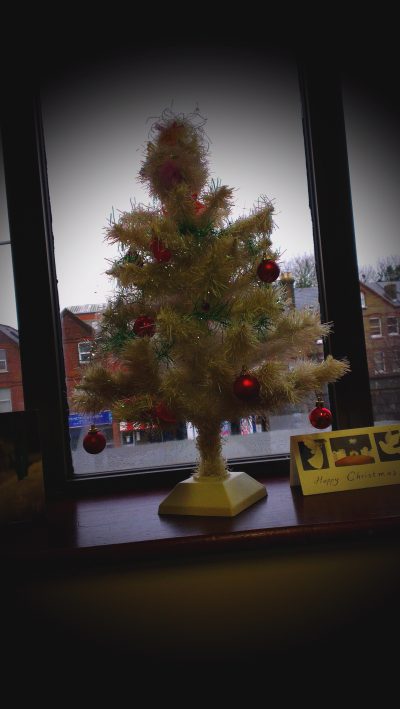Good Christians All, Rejoice! (Ros' Blog)

Last Wednesday I was invited to take my daughter to a different kind of carol service at a church in a town half an hour from home. Never one to miss out on a good carol sing, Ellen was enthusiastic about going. For those who don’t know her, Ellen, who is now 32, was born a little over 3 months prematurely and has cerebral palsy, a learning disability and autism.
The church – Kerith Community Church in Bracknell – might have been giving a textbook demonstration of how these things should be done. As we entered the car park, a man in a high-viz jacket spotted our blue badge and directed us round towards the main entrance to the building. We drove down there and another high-viz man showed us into a blue badge parking space and held a torch so I could see to undo all the belts and karabiners to get Ellen in her chair onto the tail lift and down out of the vehicle. We mounted the pavement via a lowered kerb and had no problem entering the front of the church and the auditorium, all of which was completely level with smooth floors over which the wheelchair glided with ease.
Ellen has a bit of a thing about hand dryers and wanted full reassurance that she would be allowed to find one to use and record on her Dictaphone at the end of the service. She was just a tad worried that the hand dryer might be too hot, and all this was uppermost in her mind as we took our seats at the end of a row in view of the door where my eldest daughter could easily spot us and come to join us when she arrived from work. A lady came over to greet us and chat. Ellen grabbed her by the arm and earnestly asked, “What does high to low mean?”
The lady did some rapid thinking and then said, “Well it means from up there” (showing height by a hand gesture) “to down there” (pointing at the floor). Ellen realised she hadn’t conveyed her meaning, so she tried again. “What does high to low temperature mean? What does turn it down from high to low mean?”
Patiently, the lady responded to her new understanding of Ellen’s meaning. “Well, it means make it a bit cooler, make it not so hot.”
Now we were getting somewhere. Ellen nodded. “What does hand dryer’s too hot mean?” (still clutching the lady by the arm). At this point I thought I ought to help interpret a bit, so I explained that Ellen loves hand dryers and was looking forward to using one at the end of the service, and was hoping it wouldn’t be too hot. The lady was able to reassure her that there was indeed a hand dryer in the accessible loo that she would be able to use.
Ellen persisted. “What does hand dryer’s too hot mean?”
“Well,” replied the lady, “it means it might burn your hands. But ours won’t burn you, it’s not too hot.” Ellen seized on this and said, “What does just right mean?”
“It means it won’t burn you.”
Satisfied with this response, Ellen let go of the lady, who smiled a few words of welcome to me and then moved on to talk to someone else. I was so grateful to her for her patience in making the effort to understand Ellen and respond appropriately, and for not making me feel awkward or embarrassed.
Moments later, the minister of the church, Simon Benham, came up to greet us. Ellen grabbed his arm. “What does high to low mean?” she asked. He hesitated and glanced at me, unsure of what response to make. I braced myself for the hand dryer conversation again. But this time Ellen continued, “What does turn the chicken nuggets down from high to low mean?”
I realised we had moved on from hand dryers, and explained to the minister that I had promised we would go home via McDonalds, and Ellen was worrying that the chicken nuggets might be too hot. Once he understood this, he had a brief chat with Ellen about McDonalds, chicken nuggets and oven temperatures. He carefully released his arm from her grasp, gently held her hand while he talked to her, and extended a warm welcome to me before moving on to welcome other people. It’s so rare to meet not one but two strangers with the patience to try to understand and respond to Ellen’s mode of communication, I began to relax and look forward to the service.
It was a wonderful service. My daughter Elise joined us, and Ellen wanted to sit next to her, so I moved up and was able to sit back and enjoy the worship while Ellen held onto Elise’s hand throughout.
This was not simply a service, but a service by and for people with learning disabilities. Most of the prayers and Bible readings and all of the Nativity tableau were done by members of the 3 disability groups for whom the service had been arranged. People were given whatever level of help they needed to be able to participate. Some of the actors carried out their parts very ably with no help. One shepherd in a wheelchair was pushed by a fellow shepherd.
People’s ability varied greatly, but they were enabled to play a full part to the fullest of their ability. Some people were able to write and read their own prayers – prayers full of sincere worship and gratitude to God. Others were able to give unaided Bible readings, some very fluently, others more hesitatingly. One lady gave a reading but couldn’t actually read, so another lady stood with her telling her what the words said, and she repeated them after her, thus being enabled to participate fully, her inability to read not being allowed to stand in her way. All the songs were accompanied by a ukulele orchestra from another local church, which gave an air of real fun to the proceedings.
The whole service was signed in Makaton by two ladies, one of whom was disabled and the other was one of the leaders of the group. All the Bible readings were projected onto a screen at the front, and a man in the row in front of me found, to his delight, that he could read all the words. He read along with the person on the platform, as loudly as he could, and at the end of every reading, turned to the people around him and said, “I read all of them words, did you hear me? I read them all, all them words.” His joy was infectious, I couldn’t help but share in his pride at his achievement. No one shushed him or looked as if they found his contribution out of place.
The leader of the service announced that it was time for the minister, Simon Benham, to give a talk, and made way for him at the lectern. I wondered how he would preach at a level appropriate to his audience. In fact, what he did was tell a story. (I often think that some of Jesus’ stories must have had their origin in those quiet early mornings He spent with His Father. Jesus knew that stories get under our radar and smuggle truths into our hearts that we might otherwise resist. And this minister seemed to have taken a leaf from His book.)
The story* was about 3 young trees dreaming of what they would like to be when they grew up. One dreamed of being turned into a treasure box, containing untold riches of gold, silver and jewellery. The second dreamed of being part of a large ship, sailing the oceans and carrying kings from one place to another. The third dreamed of being left to grow into a tall tree on top of a hill, with branches giving shelter to the birds, a source of life for the creatures around it.
Sadly, the first one found itself cut down and fashioned into a lowly feeding trough. The second one was just made part of a very small rowing boat. And the third one was cut into planks and left piled up. But one day, Mary laid her baby in the feeding trough, and its dream came true – it was holding the most priceless treasure in the universe. Some years later Jesus, needing to speak to a large crowd on the shore, stepped into the rowing boat to preach, and after that the disciples rowed him to the other side of the lake – now the second tree’s dream came true as it carried the King of Kings from one place to another. Finally, there came a day when the planks were nailed together into a cross and erected on top of a hill, where Jesus died to save us from our sins and the tree indeed became a source of life – eternal life – for everyone. The minister finished by emphasising how all these incidents from Jesus’ life show us how much God loves us and what lengths He went to so we can be His friends. And there it was - the Gospel presented in a way that was accessible to everyone present.
We stayed for coffee and mince pies (Ellen doesn’t like either of these but biscuits and Ribena were on offer too so she was happy). Then we got to use the hand dryer in the large accessible loo and record it on the Dictaphone before heading off via McDonalds. Once again high-viz-man-with-torch lighted our way as I raised Ellen via the tail lift into her vehicle and fastened all the belts and karabiners. Ellen had thoroughly enjoyed her evening, had been welcomed and accepted just as she was, and had heard the Gospel of how much God loves her. And I decided to blog about it so that others can discover a great example of how church can be blessed when people with learning disabilities lead and are involved in a service designed around their strengths and abilities.
(* - Taken from The Tale of Three Trees : A Traditional Folktale by Angela Elwell Hunt, Lion Children's Books; Lion Publishing; Abridged edition January 2001)

